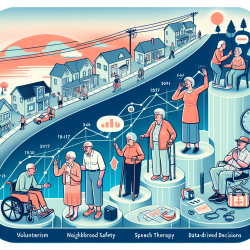Introduction
In the ever-evolving landscape of the COVID-19 pandemic, understanding the nuances of vaccine efficacy and symptom manifestation is crucial for healthcare practitioners. The study titled "SARS-CoV-2 Symptoms during the Omicron Surge Differ between Boosted and Vaccinated Non-Boosted Persons" offers valuable insights into how booster vaccinations influence the symptoms of breakthrough infections. This blog aims to highlight the key findings of the study and encourage practitioners to integrate this knowledge into their practice or pursue further research.
Key Findings
The research conducted at New York Medical College (NYMC) involved 476 students and employees, focusing on the differences in symptoms between those who received a booster dose and those who did not. The study found:
- Boosted individuals reported a higher frequency of nasal congestion (57.9% vs. 44.4%) and nasal congestion and/or sore throat (77.2% vs. 62.0%).
- Body/muscle aches were significantly less common among boosted individuals (22.1% vs. 32.4%).
- As time since booster receipt increased, the probability of fever and cough also increased significantly.
Implications for Practice
For practitioners, these findings underscore the importance of considering the timing of booster vaccinations when evaluating symptoms in patients. The data suggest that booster vaccinations may alter the clinical manifestations of SARS-CoV-2 infections, potentially affecting symptom management strategies.
Practitioners should be aware that boosted individuals might present with different symptom profiles compared to non-boosted individuals. This knowledge can aid in more accurate diagnosis and treatment planning, particularly during the ongoing Omicron surge.
Encouraging Further Research
While the study provides significant insights, it also highlights the need for further research to fully understand the relationship between booster vaccinations and symptom manifestation. Additional studies could explore the long-term effects of booster doses on symptom severity and duration, as well as the potential impact of different COVID-19 variants.
Healthcare professionals are encouraged to contribute to this growing body of research by conducting their own studies or collaborating with academic institutions. By doing so, they can help refine our understanding of COVID-19 and improve patient outcomes.
Conclusion
The study "SARS-CoV-2 Symptoms during the Omicron Surge Differ between Boosted and Vaccinated Non-Boosted Persons" provides valuable insights into how booster vaccinations influence COVID-19 symptoms. By integrating these findings into clinical practice and pursuing further research, practitioners can enhance their ability to manage and treat COVID-19 effectively.
To read the original research paper, please follow this link: SARS-CoV-2 Symptoms during the Omicron Surge Differ between Boosted and Vaccinated Non-Boosted Persons.










